Caroline Leavitt's Blog, page 38
August 11, 2016
Anne Korkeakivi talks about love, loss, Woodstock, and so much more, including her amazing new novel SHINING SEA
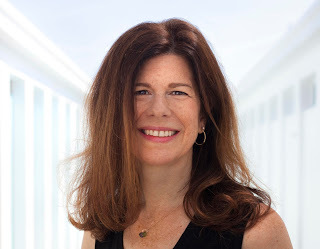
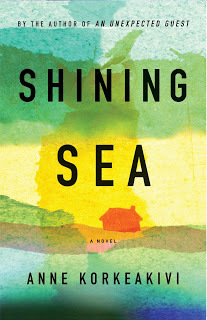
Yep. I loved this novel so much, I blurbed it. "An absolutely transcendent novel about great love and great loss, with a majestic sweep from WWII to Woodstock to modern times. About the memories that change—and save us—and the connections one extraordinary family breaks and remakes. So alive, the novel virtually breathes."
Anne Korkeakivi is the author of the novels An Unexpected Guest (2012) and of course, Shining Sea, both from Little, Brown & Co. Her short fiction has been published by such as the Atlantic, the Yale Review, Consequence magazine, and the Bellevue Literary Review, and she is a Hawthornden Fellow. Her nonfiction has appeared in the New York Times, the Wall Street Journal, the Times (UK), Travel & Leisure, Time, Ms., The Millions, and many additional periodicals in the US, the UK, and online. An essay that ran originally in Brain, Child was recently chosen for Best Women’s Travel Writing, Vol. 10.
I am so thrilled to hos t her here. Thank you so much, Anne!
I always want to know what is haunting an author before he or she begins writing--because usually that comes out in the novel. What was haunting you? What was the spark for this incredible novel?
Very first, thank you for such nice words.
War haunts me, and all and any violence within humankind. It’s something I think about a lot in a broad global sense. But the germ for SHINING SEA came in a very personal way, with the death of my father shortly before my first novel, AN UNEXPECTED GUEST, came out. In his wallet we found his driver’s license, a few credit cards, some cash, his medical insurance card. And his honorable discharge card from the US Army.
My father served--in Italy, as infantry and then a code-breaker--during WWII. He died at age eighty-eight. He’d been carrying that card for sixty years.
He didn’t need to have it on him in order to receive veteran’s benefits. His service in WWII was simply that important to him. WWII was incomparably meaningful as well to my mother who was, as the youngest girl in a family of seven children, the only one amongst her siblings not to have served in that war. She lost both family and friends.
My own first experience of war was very different. I grew up next door to Columbia University in the 1960s and 70s, and some of my very earliest memories are of angry students blocking the campus’s front gates, incendiary nighttime protests in Riverside Park below my window, and sitting cross-legged beside my big sisters to watch Walter Cronkite give the nightly body count from Vietnam on the television.
My parents’ feelings about WWII had to have affected me. But my own introduction to war was diametric to theirs. That dichotomy was the genesis for SHINING SEA.
I loved the grand sweep of history, from Viet Nam to modern times. What was your research like, and what surprised you?
One of the greatest challenges in writing SHINING SEA was not falling down the rabbit hole. The research it required--given the many time periods, historical events, and locations that are woven into the book--was prodigious. If you include the flashbacks to the Bataan Death March and liberation of American POWs in the Pacific that appear in its first chapter, the novel stretches back all the way from the present to WWII. There also is one brief passage set still further back, in 1929. I studied it all.
Although the wartime passages only comprise a few pages of the novel, I particularly buried myself in whatever books, articles, and websites I could find on the American WWII experience in the Pacific arena. This was important to understanding the man Michael became, the man his family remembered and enshrined. The more I read, the more astonished I was that so relatively few works of fiction have captured this hellish blight on history. Close to half of the US POWs in the Pacific died during their three years of captivity. Brutal doesn’t begin to describe their treatment and living conditions.
Researching SHINING SEA brought happy surprises too, though. For example, it gave me an excuse to re-watch Michael Wadleigh’s Woodstock documentary and read all the news stories around that iconic festival; despite all that crowd, all those drugs, and all that mud--an absolute mess--there was not a single reported incident of violence.
Another positive surprise always is how generous people can be towards writers in their research. One section of SHINING SEA involves a traditional Irish boat called a currach. Finding little published information, I reached out to a currach-builder and sailor in Northern Ireland. He responded patiently to countless emails and eventually spent an entire weekend taking me around Northern Ireland’s wild coast, sharing its beauty and stories and finding currachs for me to see. This was someone I’d never before met! Many other people also were generous with their time and knowledge.
Humankind can behave horrifically. Individuals can be so lovely.
I also deeply admired that the earth itself seemed to be a character--those terrifying chapters out at sea, the earthquake. Can you talk about that please?
Thank you so much for that, and thank you for noticing. I don’t want to give away too much of SHINING SEA’s story, so I’ll simply note that contemporary history plays an important part in the novel, and in particular American history, and how can you talk about either America or history without talking about the Earth and nature? We are our Earth, even if sometimes we appear to have forgotten this.
What kind of writer are you? Do you outline, plan things out, or just try to grab onto that pesky muse?
My fiction typically starts with a question and my process typically is to spend ages, before I do anything else, thinking about that question. I turn it this way and that in my head, examining it from all perspectives. My characters begin to come to life, and I’ll spend a long time getting to know them. As the question evolves into the story, and it and the characters become intertwined, I’ll also start researching. Actually putting the words down on paper then goes fairly swiftly. However, I also appear to be the kind of writer who goes back after she’s finished a draft and throws out anything from the first fifty pages to fifty percent of the pages, and starts over.
I usually know where I am headed (that place being open to adjustment) but don’t use any sort of written outline for the plot. For SHINING SEA, however, I did create spreadsheets that listed every character’s precise age in every chapter. I kept them taped to the wall above my desk.
What's obsessing you now and why?
The word "obsess" frightens me because it bears a connotation of "possess" and I don't want to be possessed. It's not because, as with the character of Francis in SHINING SEA, I’m scared of having someone depend on me; I’m a completely steady and devoted parent, for example. But I won't even drink coffee, because I don't like to become dependent on anything.
So while there are things that, were I willing to admit it, obsess me--ranging from the need for sensible gun control in the US to the sweet scent of the linden trees outside my door--at the risk of sounding goofy, I'd rather talk about what’s “impassioning” me. And, as this response indicates, language might be a good place to start.
What question didn't I ask that I should have?
These were great questions: so smart, probing, and original. If anyone wants more of me, they’re welcome to find me on Twitter, Instagram, and Facebook. Or to email me via the contact page on my website. Or come to one of my author events--welcome!
Thank you again for inviting me to CarolineLeavittville!
Published on August 11, 2016 18:18
August 1, 2016
WIN one of 5 signed copies of Adriana Trigiani's dazzling novel All the Stars in the Heavens (now in paperback)! Here, she talks about Loretta Young, advice to her young self, Hollywood glamour and so much more
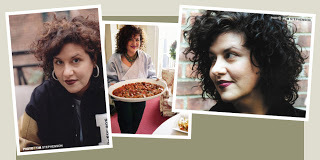 The dazzler herself
The dazzler herself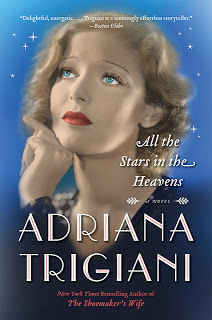 The brilliantly entertaining novel itself
The brilliantly entertaining novel itself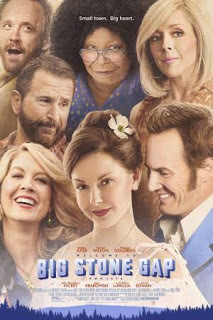 Adriana wrote and directed this adaptation of her novel
Adriana wrote and directed this adaptation of her novel 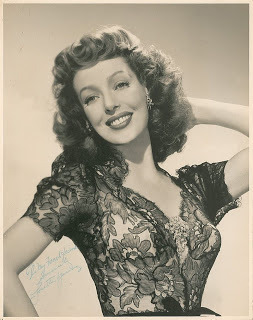 The one, the only, Loretta Young
The one, the only, Loretta YoungWant to win a signed copy of Adriana Trigiani's dazzler All The Stars in the Heavens? She's offering 5 books to giveaway, and all you have to do to get one is to add a comment below this interview. First five to do so are winners! (To check your status, email me through my website www.carolineleavitt.com)
What is it about Adriana Trigiani that everyone loves so much? I first met Adriana Trigiani at a BEA author's lunch. There were three of us...and there was Adriana. My editor said, "Do you want me to introduce you?" Of course I did. She brought me over to Adriana and Adriana leaped up and hugged me. You couldn't help but fall in love with her. She spoke last, was hysterically funny, and talked about the other authors' books, too! Instantly, she became my heroine. She's funny, smart, and this book, All The Stars in the Heavens is as sparkling as she is. I'm so honored to host her here. Thank you Adriana!
And here is the amazing bio: Adriana Trigiani is beloved by millions of readers around the world for her bestselling novels, including her latest, All the Stars in the Heavens, the instant bestseller of The New York Times, Barnes & Noble, Publishers Weekly, USA Today, and Indie Booksellers nationwide. She wrote the blockbuster The Shoemaker’s Wife, the Big Stone Gap series, the Valentine trilogy and Lucia, Lucia. Trigiani’s themes of love and work, emphasis upon craftsmanship and family life have brought her legions of fans who call themselves Adri-addicts (a term coined by book maven Robin Kall). Their devotion has made Adriana one of “the reigning queens of women’s fiction” (USA Today).
The New York Times calls her “a comedy writer with a heart of gold”, her books “tiramisu for the soul.” Her books have been translated in 36 countries around the world. Adriana has toured many of the countries, including South Africa, with annual visits to the United Kingdom.
Adriana wrote and directed the film adaptation of her debut novel Big Stone Gap, produced by the Academy Award winning producer Donna Gigliotti, shot entirely on location in her hometown, with an all star cast including: Ashley Judd, Patrick Wilson, Whoopi Goldberg, John Benjamin Hickey, Anthony LaPaglia, Jenna Elfman, Jane Krakowski, Judith Ivey, Mary Pat Gleason, Dagmara Dominczyk, Mary Testa, Paul Wilson, Chris Sarandon, Jasmine Guy, and introducing Erika Coleman and Bridget Gabbe, with music by John Leventhal, and songs performed by his lovely wife, Rosanne Cash. Glorious local talent perform on the soundtrack and act in the movie, sharing their gifts beyond the peaks of the Appalachian mountains. The soundtrack is now available on iTunes and in stores.
AND All The Stars in the Heavens was an instant bestseller from independent bookstores, the New York Times, Barnes and Noble, Publishers Weekly. And it's a finalist for the 2016 Library of Virginia Peoples Choice Award for Fiction.
Adriana, for this and for everything--a multitude of thanks.
Why do you think people love Loretta Young so much?
I think folks love her take charge personality, style, sense of humor and moxie. After all, Loretta Young was cutting edge before anyone defined the edge or knew how to cut it. She was in movies from the age of 4, radio in the late 30's, first movie star to blaze on to television on her own terms-
Oscar winner, three time Emmy winner- she was a force of nature. She had great beauty, but there was substance there- and she wasn't ashamed to say what she thought. Loretta Young's career spanned the 20th century, she managed stardom, a family and a life of faith, which is to be admired.
She had a wonderful relationship with her mother, who had a big career as an accomplished interior designer- and you know I love a great mother/daughter love story.
What was your research like? Did you find out anything that surprised you?
The research was so interesting, I haven't stopped reading about the era and its players. History rarely credits women with their accomplishments in any arena, but show business should know and do better, after all, half the audience is women, and without us, the stories would be duds. While Loretta Young was an astute businesswoman and had good taste and as an actress was discerning about choosing scripts, she was surrounded by women who were also making the golden age of Hollywood dazzle. Writers including Anita Loos, Frances Marion, June Mathis, and Jeannie Macpherson are rarely celebrated, but their work stands as some of the best from the early days of Hollywood. June Mathis invented the screenplay format we use today.
I loved learning that Frances Marion went to Hollywood to paint movie posters, by chance met the biggest star of the day, Mary Pickford who was cutting (editing) her own movies, and they decided to collaborate, actress and writer to create some great movies. They were also dear friends, which has been my experience working in Hollywood. Ida Koverman, who appears in the novel worked as Louis B. Mayer's secretary, but she was so much more, she was really his development director, casting director and production executive. Another favorite of mine is Margaret Booth, who began her career as a film "joiner" for D.W. Griffith. She became one of the great film editors of the last century (Mutiny on the Bounty 1935), and trained a generation of great editors including John McSweeney, Jr. (Mutiny on the Bounty 1962). The research made me appreciate the movies and what they meant to American cultural life, to the aspirational life of the working person. As you know, those are the waters I swim in, so I found this arena so exciting, so dreamy, and thrilling.
What do you want people to come away with from this novel?
I hope my reader gets a peek into a world gone by, with a story sprung from my imagination
woven from the disparate threads of the players of the time, recorded by historians and the players themselves. My favorite books are biographies and autobiographies. A life story told by the person who lived it is always fascinating, but it also defines time in a way no other historical writing can.
I want to ask, if you could go back to young, young Adriana, before you had published anything at all, what advice would you give yourself and why?
I would tell her the same thing I tell myself today: be grateful, be humble, and help everyone you can, as much as you can, because encouragement nourishes a weary soul and uplifts a yearning heart.
What’s obsessing you now and why?
The 2016 presidential election- I am reminded of the great Edna Ferber's words, which appear in this novel, and appeared in her autobiography, when she spoke of the leaders in Europe before World War II, she said, "Beware the clowns." History prepares us for everything, if only we paid attention.
What question didn’t I ask that I should have?
Would you have liked to work in the studio system during the golden age of Hollywood?
I would have loved it. When I was working in Hollywood, I'd walk around the studio lots and think, "Ginger Rogers walked here, Myrna Loy was over there, Preston Sturges wrote in that bungalow." There's something about a dream factory. It belongs to everyone, the artists, the producers,
the technicians, the crew and the audience. We're all hoping for the same goal: to be swept away.
Published on August 01, 2016 14:19
Carolyn Parkhurst talks about Aspergers, why we don't know anything about parenting until we become a parent, The Simpsons, and Harmony, her gorgeous and moving new novel
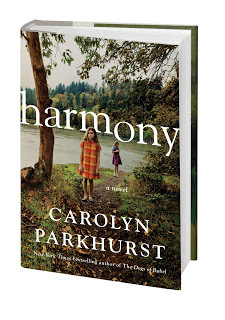
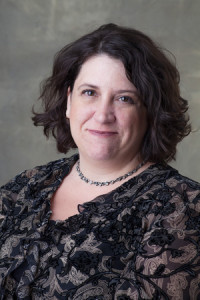
Carolyn Parkhurst is the New York Times bestselling author of the novels, The Dogs of Babel, Lost and Found and The Nobodies Album, as well as a children’s book, Cooking with Henry and Elliebelly. Her new novel, Harmony, is an extraordinary story of a family who leaves everything behind to try and live a new kind of life. I'm honored to have her here. Thank you so much, Carolyn!
What haunted you into writing this novel? Were you haunted?
Well, yes and no. My fourteen-year-old son has Aspergers, and a lot of the impetus for the novel came from my own experience of parenting him. Right from the beginning, he seemed different from other kids, in ways that were positive as well as negative, and that made it difficult to compare notes with other parents, to seek out that parental camaraderie that can be so useful in navigating motherhood. For example, he memorized all fifty states on a U.S. map when he had just turned two; my husband and I were proud, but also kind of baffled. It felt a little bit like bragging to talk about it, to even tell the story, and even though we knew it indicated extraordinary mental power, we did sort of understand that it also indicated some divergence from the usual course of development. Then, when he was three, he had an enormous meltdown one time because he asked us how to spell “concrete,” and our answer didn’t make sense to him. (He was sure that it ended with a k-sound.) None of this seemed even remotely similar to what our friends with similarly aged kids were going through.
So actually, a lot of the writing of this book (especially the sections told from the point of view of the mother, Alexandra) was cathartic, which I think may be the opposite of “haunting” in some sense. But it was also clear to me that this was a book with an unusual amount of baggage attached to it. (And in case that wasn’t obvious to my conscious mind, I had a recurring dream about having to pack up an entire apartment or house or dorm room in an impossible amount of time.) I worried a lot about whether I was “allowed” to be writing a novel which mirrored my personal life and drew material from my own children so clearly.
The Family Camp was so uncomfortably strange that I wonder if you've visited a place like this as research?
I’m not sure there are any places exactly like Camp Harmony, although I know that there are “family camps” (which are sort of modern versions of Kellerman’s in Dirty Dancing), as well as camps that are designed to help families with special-needs kids in various ways. But I did draw some inspiration from the location, which is Lake Winnipesaukee in New Hampshire. As a kid, I went on a lot of vacations to “cottage colonies” in that area, and that’s what provided most of the visuals and atmosphere for me in creating the setting.
There is a breathtaking coda at the end of the novel, which I won't give away, but I do want to say that it's the loveliest manifestation of parental love I've ever read. It goes beyond acceptance into championing. Why do you think so many well-meaning parenting advice backfires?
I think that one problem with parenting advice is that it takes a “one size fits all” approach, when in fact there’s a lot of variation in what strategies work with different kids. When my son was little, I bought dozens of parenting books on subjects that we were struggling with, like sleep habits and discipline, and for the most part, none of the recommended methods worked with him. I was kind of amazed when my daughter (who’s almost four years younger and is completely neurotypical) was born, to discover that a lot of those strategies did work for her. But not everything works for every kid, and it’s very much a matter of understanding your own child and what makes him/her tick.
I know that a lot of people (me included) think that we know a lot about parenting before we actually have kids, and then it all gets blown out of the water once this tiny little tornado enters your life. And then you start to think you’re an expert, but if you have a second kid, you realize that you were only ever an expert on the first individual child; the second one is completely different. In the same way that waiting tables in college made me a good tipper for life, the experience of parenting two very different kids has made me a lot less judgmental about other parents.
What do you think it means to be different in a society that would prefer to keep square pegs in square holes?
Like so many things, I think it’s a matter of degree. I know many people who felt slightly out of step with other kids when they were growing up; I think it’s almost a universal component of identity formation to discover the ways that you’re not like the majority (or the perceived majority). You don’t fit in with the cool kids or the athletic kids, or whatever, and you figure out who you are in relation to them. And there’s a tendency to look at kids who are diagnosed with autism or ADHD and say, “Well, thirty years ago, they just would have been considered quirky.” Or “There’s nothing wrong with marching to a different beat.”
But I think that does a disservice to these kids (and the adults they grow up to be), because there are real differences. Sometimes having a kid with special needs helps me to clarify what my job is as a parent: it’s really about making sure that your child will be able to function in the world on their own. It’s fine to march to a different beat, as long as you know how to talk to a co-worker and remember to do your laundry regularly and pay your bills on time when you’d rather be playing video games all day. There are a lot of unspoken rules that most kids pick up instinctually, incidentally. But the ones who don’t need help and constant support. It’s been obvious since my son was tiny that he has a huge amount of potential. But he’s going to struggle more than other kids in figuring out how to unlock that potential while simultaneously living in the world.
Again, because your novel haunted me so much, I want to know what was it like writing the book? Did you know the whole arc before you put pen to paper?
No, I didn’t; in fact, I never do. My goal in terms of plot is always to create a story that makes readers want to keep turning the pages, but it’s always the emotional content that comes first. With this book, I went through several different possible endings, and there were a lot of scenes at the camp that later got deleted or modified. I’m always much more clear on what I want to convey about the characters and their inner lives than I am on the external events that create the bones of the story. That only comes through writing and revising, trying different things out and seeing which of them work.
What's obsessing you now and why?
Well, the obvious answer is the election, but honestly that’s a subject that’s so fraught and anxiety-laden that I’m trying not to obsess about it. As I write these answers, I’m on vacation, with my family and my husband’s extended family, and it’s been such a lovely relief to focus on nothing but happy and relaxing things. So today I’m obsessed with the pool and the beach, heat and sunscreen, my kids and the cocktail I’m going to have when it isn’t even dinnertime yet.
What question didn't I ask that I should have?
What was the most fun detail of writing the book? I have one minor character, a kid at the camp, who’s obsessed with The Simpsons, and I had a great time coming up with Simpsons quotes for him to insert into conversation. I’m a die-hard Simpsons fan. (I mean, I agree with critics who say that not every season has lived up to its full potential, but I think it’s like Saturday Night Live at this point—it’s contributed so much to pop culture at large that I’m willing to overlook its low points.) And so this kid’s obsession is something I picked strictly because I knew I’d have fun with it. I think that a lot of authors probably do this—throw in a little something that isn’t crucial to the larger work, but is meaningful or interesting to us personally. And for me, this time around, it was picking the right Simpsons quote for every occasion.
Published on August 01, 2016 10:46
Marti Leimbach talks about AGE OF CONSENT, autism, blogging, memory, secret lives, and why a young girl would be with an older man
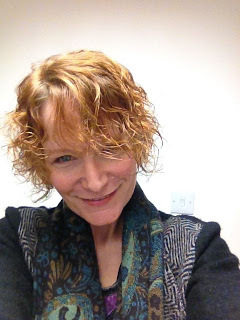
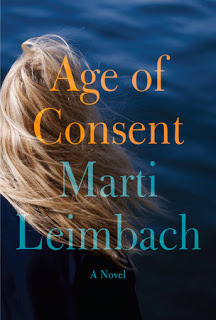
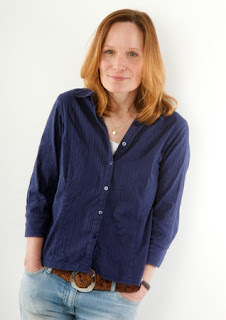
I love books that unsettle me, that wrestle me into thinking about something in a way I hadn't before. And of course, I love books that make me feel--even if it is feeling something uncomfortable. Marti Leimbach's AGE OF CONSENT is a gripping story of mothers and daughters, memory, secret lives and so much more. I'm so jazzed to host Marti on my blog.
Marti Leimbach is the author of several novels, including the international bestseller Dying Young, which was made into a major motion picture starring Julia Roberts. Born in Washington, D.C., Leimbach attended the Creative Writing program at University of California, Irvine, and Harvard University. She currently lives in England and teaches at the University of Oxford’s Creative Writing program.
I’m always curious about why a writer needs to write a certain book. What sparked you?
I was preparing for a class for I was teaching for University of Oxford and feeling a little stuck for ideas on writing exercises for my students. So I went to Writer’s Digest—why not? There was a competition being advertised on the site. I didn’t enter the competition, but I noticed the “writing prompts” that were used. One of them was a large Motel sign lit up in neon colors against a night sky. For some reason, the image stayed in my mind.
Shortly after, I wrote a scene in which a girl, newly fifteen, enters a motel room and has sex with a man she doesn’t like much. That has become her habit, to allow the sex because she doesn’t know how to stop it. I knew immediately that I’d tapped into a memory from my own life. The motel was like one I’d been taken to under those same circumstances.
The girl in the novel has been to a motel like this before, too, always for an hour or so with this same man. She isn’t attracted to him, doesn’t like the sex, is ashamed to be there, but also ashamed to disappoint him. She feels obligated. She is bound to him. I knew how she felt. I remembered it exactly, not the details but the feelings, the sense of being paralyzed in your own life, unable to maneuver away from what was expected of me. I knew the indifference to the physical act, the worry of being caught. But for this character, I could provide an escape. I could create it with a few sentences. And so she finds something in the motel room. She finds a thousand dollars. It’s enough to change her life if she can get home without the man noticing.
How was writing this novel different from writing any of your others?
AGE OF CONSENT required tools I’d never needed before. For example, I had to write sex scenes that took place between different people and at different times in these people’s lives. I’m a writer who has spent her career trying to avoid such scenes, but how do you write about a sex scandal without any sex?
Specifically, there was the challenge of writing the sex scenes involving fifteen-year old Bobbie. They couldn’t be lurid or arousing. I’d rather have scrapped the book than contribute to sexualizing children and young teenagers so the scenes in which the fifteen year old is engaged in sex required very careful crafting
It was new for me to write about characters at different times in their lives. We meet Bobbie as a teenager and as a mature woman. We see the deterioration of her mother, June. The gawky teenaged boy becomes a dignified, handsome man. Everyone changes in some ways, but remains the same in others. The traversing of time between 1978 and 2008 means that the relationships between characters was even more complex than I am used to handling. How would a mother feel about seeing her daughter for the first time after thirty years? What would it be like to make love to a man you knew decades ago? And most importantly, how does the victim of a child sex crime respond to the abuser now that she is a grown woman? Why is the shame still there, shame she wasn’t even aware she was carrying?
There was one phrase you used, “the terror of regret” that I just loved. Can we ever not regret?
Occasionally, I bolt upright in bed recalling how I failed to adequately express my gratitude toward an individual, or said something inappropriate to another. I think all of us are stuck with those annoying pangs of misgiving, but we don’t have to dwell upon them.
As for more serious regrets, we always have the option to berate ourselves for what we have done, the opportunity to review our life and judge it. It’s there, like a door we can go through just to hurt ourselves a little. We go back to a certain moment in which we made a decision or behaved in a particular way and tell ourselves everything would have been different “if only.”
But this isn’t true. We only imagine we can predict everything that would have transpired had we done things differently. Judgments of this sort are about something that no longer exists, that is, the past. For the time that we are examining our lives and judging ourselves, we are almost in a fantasy, a daydream of another age. It’s fine to live in that world of imaginings as a writer, to dramatize those bad decisions, those terrible consequences. But it is not a good idea to live there was a person. It only hurts.
Your novel is also concerned with what we remember and why—and how we are able to live with that. Can you talk about that please?
You ask about what we remember and, of course, our memory is full of bias. I recently came across a man who served as vice principal in the high school I attended in the 1980’s. “You probably don’t remember anything good about me…” I began. I remembered myself as I had been during high school: my confusion and rebellion, my exhaustion from working jobs as well as attending class, the disappointing math scores, getting in trouble over hall passes and unexcused absences, and smoking in a bathroom, how few friends I had, how I dropped out, then dropped in.
Fifty-two years old and I’m sitting there feeling ashamed. I didn’t think I could stand to hear this retired vice principal’s response. But all he said was, “I don’t remember anything bad about you at all.”
It was as though a weight dropped from me, all that tension over an opinion he didn’t even hold about a girl who had been me, and about whom we had very different memories.
I know Aristotle wrote, “An unexamined life is not worth living” and I agree that we need to get quiet and think about our motives for doing what we do, how we treat people, whether we are becoming more selfish or less selfish, more loving or less loving. This kind of moral inventory is beneficial, if not necessary.
Ultimately, however, we have to accept what has happened. Those who despise themselves for all the things they’ve done wrong in the past are on a rough road that helps no one. A life in which we refuse to accept our own humanity with all its warmth and light—as well as all its ills and sorrows—is an exercise in torture.
What’s obsessing you now and why?
So, one of my goals—let’s call it a “stretch” goal—is to help my son with autism into young adulthood. This is my real life son, the boy on whom the novel, DANIEL ISN’T TALKING was based. It’s been ten years since the publication of that book and he’s now talking all right. In fact, he speaks four languages. But as a high functioning autistic young man he needs a lot of coaching. I cling to the hope he can live independently, that he has that option at least, and this is my main concern.
And I’ve discovered my blogging voice—finally! I’m currently engaged in a series of blog I call The Writer’s Economy in which I look at the various economies in which writer’s operate, those of money or self-realization or critical acclaim etc, and tease out what are the rewards of writing in an increasingly difficult market.
What question didn’t I ask that I should have?
I love this question…I feel like a kid with a purple crayon and a big blank wall. You might want to ask me what a child or a teenager might do if they ever find themselves in the same situation as my character, Bobbie.
Just to clarify, Bobbie has spent a year in a sexual relationship with a man in his twenties. She has just turned fifteen. She would like to end the relationship, but doesn’t know how. She may not even feel she has a right to end it.
It is so easy for kids to believe that they can handle almost any situation. I remember when I was a teenager thinking I could look after a great deal more than was reasonable. I thought I could work certain jobs or travel distances or solve my own medical problems. “Take these antibiotics,” a friend would say. “My dad never finished them and they might cure your sore throat!”
Published on August 01, 2016 10:36
July 20, 2016
How scary do you think it would be if you were the highly respected book editor of Glamour and then you wrote your debut? Not so terrifying after it becomes a smash! Elisabeth Egan talks about her acclaimed debut: A WINDOW OPENS, her bronze Addidas sneaker
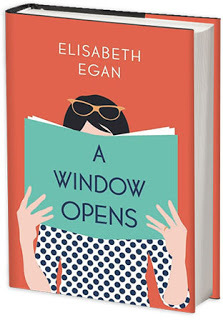
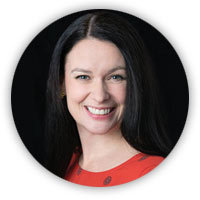
Elisabeth Egan is the books editor at Glamour. Her essays and book reviews have appeared in Self, Glamour, O, People, Publishers Weekly, Kirkus Reviews, Huffington Post, The New York Times Book Review, LA Times Book Review, The Washington Post, Chicago Sun-Times; and Newark Star-Ledger. And like me, she's a Jersey girl. and loves Cheez-Its. I'm thrilled to have her here to talk about her debut, A WINDOW OPENS. Thank you so much, Elisabeth!
I have to ask you the “why now” question that I always ask authors because I always think that something is prodding at them, or haunting them, so they have to write a particular book at a particular time. Was there anything like that for you?
I was about to turn forty and writing a book was at the top of the list of things I’d always wanted to do but never had the guts to try. Also, like many writers, I wrote the book I wanted to read. I kept coming back to the idea of the middle-aged coming of age—the possibility of reinvention long after your life is supposedly “set.” My life never feels that way, which is both liberating and maddening, so I wanted to explore the world of another woman who felt that way, too.
I ALSO have to ask because you’re the Books Editor at Glamour—how scary was it to write your own novel?
Scary is an understatement. Other words that come to mind: humbling, humiliating, embarrassing, exasperating. It’s so much easier to read other peoples’ books than it is to write one of your own! But I think the experience of writing one made me a more careful reader. This is a weird parallel, but when I was a babysitter, I remember looking at frazzled, exhausted parents and thinking: why is this so hard for them? How hard is it to keep decent junk food in the house, or to teach your kid not to draw on the walls? Then I had kids of my own and I got it: loving and launching a human being requires gumption, courage, a sense of humor, an endless reservoir of patience. It’s a leap of faith, just like writing a novel. Now when I pick up a new book, I know I’m holding someone’s dream in my hands. I approach with kindness and respect (and also, hopefully, with Cheez-Its).
So much of this funny, smart book is about trying to do it all, especially in a city as complex as New York City (where I was once actually stopped by someone because I “was wearing last year’s boots.”) What I especially loved was how Alice’s plans always go into reverse, and what she thinks is going to happen, doesn’t—but sometimes, something better does. Do you try to operate that way, as well, taking things easy and seeing where they go, or do you feel a need to have at least some control? (I’m totally obsessive compulsive and I over-organize everything.)
I’m the worst kind of person: I’m a control freak, but I never quite manage to get things under control. Does that make sense? Like Alice, I have big dreams and grand plans…and I tend to botch the very things I’m most excited about. I’ve ruined more than one surprise party by showing up a week early. However, I definitely subscribe to the theory of “When a door closes, a window opens.” (Hence, the title of my book.)
Scroll, the hip new bookstore that is going to change “the future of reading” was hilariously depicted, as was Alice’s job at the magazine. Why do you think business people sometimes get things so weirdly off?
This is a good question! I think the world needs less of thinking like a Business Person and more thinking like a Person. No need to hide behind weird lingo; just talk to me in a language I understand.
When you discover what it is you want, do you think you can have it—even if it is a four-part answer?
I believe if you want something badly enough, it’s possible that you might be able to make it happen. There’s no guarantee, of course, but the experience of writing A Window Opens taught me a little bit about breaking a big goal into small parts. I felt overwhelmed by the idea of writing 80,000 words, so I focused on writing 500 words. I couldn’t imagine telling a big, important story, so I started thinking in terms of small moments that were important to me. I didn’t have eight hours a day to write, but I did have 45 minutes while I was commuting to work. I boarded the train, laptop in hand, and plowed ahead from there.
What kind of writer are you? Did you know how Alice’s story was going to end up when you started? Do you map things out or just beg the Muse to help you? And what surprised you in the writing of this novel? Did you have a moment when what you thought you were writing about began to turn into something else? What did you learn about yourself?
I’m a disciplined writer in the sense that I know how long I have to work every day, and I stick with that plan as if I’m a runner training for a marathon. I won’t go out for coffee, I won’t return my mom’s phone call, and I won’t fold the mountain of laundry on the dining room table even if that task is infinitely more appealing than stringing together uninspired words. So I’m disciplined about my schedule, but not about the story I’m writing. I don’t do an outline or a storyboard. I knew where Alice would start and where she’d end up, but how she’d get there was murky at the start. I like to be able to follow a tangent—sometimes it’s a gigantic waste of time, but otherwise, you end up somewhere unexpected and fun. What surprised me: that I stuck with it (I’m the doyenne of the unfinished knitting project). What I learned about myself: you can teach an old dog new tricks.
What’s obsessing you now and why?
My new bronze Addidas sneakers. I feel like I’m really going places when I wear them.
What question didn’t I ask that I should have?
You forgot to ask about my cats, Kevin and Arthur. They’re a handsome duo, and the best writing partners I know. Pictures provided upon request.
Published on July 20, 2016 10:31
How scary do you think it would be if you were the highly respected book editor of Glamour and then you wrote your debut? Not so terrifying after it becomes a smash! Elisabeth Egan talks about her acclaimed debut: A WINDOW OPENS, her bronze Addidas sneaker


Elisabeth Egan is the books editor at Glamour. Her essays and book reviews have appeared in Self, Glamour, O, People, Publishers Weekly, Kirkus Reviews, Huffington Post, The New York Times Book Review, LA Times Book Review, The Washington Post, Chicago Sun-Times; and Newark Star-Ledger. And like me, she's a Jersey girl. and loves Cheez-Its. I'm thrilled to have her here to talk about her debut, A WINDOW OPENS. Thank you so much, Elisabeth!
I have to ask you the “why now” question that I always ask authors because I always think that something is prodding at them, or haunting them, so they have to write a particular book at a particular time. Was there anything like that for you?
I was about to turn forty and writing a book was at the top of the list of things I’d always wanted to do but never had the guts to try. Also, like many writers, I wrote the book I wanted to read. I kept coming back to the idea of the middle-aged coming of age—the possibility of reinvention long after your life is supposedly “set.” My life never feels that way, which is both liberating and maddening, so I wanted to explore the world of another woman who felt that way, too.
I ALSO have to ask because you’re the Books Editor at Glamour—how scary was it to write your own novel?
Scary is an understatement. Other words that come to mind: humbling, humiliating, embarrassing, exasperating. It’s so much easier to read other peoples’ books than it is to write one of your own! But I think the experience of writing one made me a more careful reader. This is a weird parallel, but when I was a babysitter, I remember looking at frazzled, exhausted parents and thinking: why is this so hard for them? How hard is it to keep decent junk food in the house, or to teach your kid not to draw on the walls? Then I had kids of my own and I got it: loving and launching a human being requires gumption, courage, a sense of humor, an endless reservoir of patience. It’s a leap of faith, just like writing a novel. Now when I pick up a new book, I know I’m holding someone’s dream in my hands. I approach with kindness and respect (and also, hopefully, with Cheez-Its).
So much of this funny, smart book is about trying to do it all, especially in a city as complex as New York City (where I was once actually stopped by someone because I “was wearing last year’s boots.”) What I especially loved was how Alice’s plans always go into reverse, and what she thinks is going to happen, doesn’t—but sometimes, something better does. Do you try to operate that way, as well, taking things easy and seeing where they go, or do you feel a need to have at least some control? (I’m totally obsessive compulsive and I over-organize everything.)
I’m the worst kind of person: I’m a control freak, but I never quite manage to get things under control. Does that make sense? Like Alice, I have big dreams and grand plans…and I tend to botch the very things I’m most excited about. I’ve ruined more than one surprise party by showing up a week early. However, I definitely subscribe to the theory of “When a door closes, a window opens.” (Hence, the title of my book.)
Scroll, the hip new bookstore that is going to change “the future of reading” was hilariously depicted, as was Alice’s job at the magazine. Why do you think business people sometimes get things so weirdly off?
This is a good question! I think the world needs less of thinking like a Business Person and more thinking like a Person. No need to hide behind weird lingo; just talk to me in a language I understand.
When you discover what it is you want, do you think you can have it—even if it is a four-part answer?
I believe if you want something badly enough, it’s possible that you might be able to make it happen. There’s no guarantee, of course, but the experience of writing A Window Opens taught me a little bit about breaking a big goal into small parts. I felt overwhelmed by the idea of writing 80,000 words, so I focused on writing 500 words. I couldn’t imagine telling a big, important story, so I started thinking in terms of small moments that were important to me. I didn’t have eight hours a day to write, but I did have 45 minutes while I was commuting to work. I boarded the train, laptop in hand, and plowed ahead from there.
What kind of writer are you? Did you know how Alice’s story was going to end up when you started? Do you map things out or just beg the Muse to help you? And what surprised you in the writing of this novel? Did you have a moment when what you thought you were writing about began to turn into something else? What did you learn about yourself?
I’m a disciplined writer in the sense that I know how long I have to work every day, and I stick with that plan as if I’m a runner training for a marathon. I won’t go out for coffee, I won’t return my mom’s phone call, and I won’t fold the mountain of laundry on the dining room table even if that task is infinitely more appealing than stringing together uninspired words. So I’m disciplined about my schedule, but not about the story I’m writing. I don’t do an outline or a storyboard. I knew where Alice would start and where she’d end up, but how she’d get there was murky at the start. I like to be able to follow a tangent—sometimes it’s a gigantic waste of time, but otherwise, you end up somewhere unexpected and fun. What surprised me: that I stuck with it (I’m the doyenne of the unfinished knitting project). What I learned about myself: you can teach an old dog new tricks.
What’s obsessing you now and why?
My new bronze Addidas sneakers. I feel like I’m really going places when I wear them.
What question didn’t I ask that I should have?
You forgot to ask about my cats, Kevin and Arthur. They’re a handsome duo, and the best writing partners I know. Pictures provided upon request.
Published on July 20, 2016 10:31
How scary do you think it would be if you were the highly respected book editor of Glamour and then you wrote your debut? Not so terrifying after it becomes a smash! Elisabeth Egan talks about her acclaimed debut: A WINDOW OPENS, her bronze Addidas sneaker


Elisabeth Egan is the books editor at Glamour. Her essays and book reviews have appeared in Self, Glamour, O, People, Publishers Weekly, Kirkus Reviews, Huffington Post, The New York Times Book Review, LA Times Book Review, The Washington Post, Chicago Sun-Times; and Newark Star-Ledger. And like me, she's a Jersey girl. and loves Cheez-Its. I'm thrilled to have her here to talk about her debut, A WINDOW OPENS. Thank you so much, Elisabeth!
I have to ask you the “why now” question that I always ask authors because I always think that something is prodding at them, or haunting them, so they have to write a particular book at a particular time. Was there anything like that for you?
I was about to turn forty and writing a book was at the top of the list of things I’d always wanted to do but never had the guts to try. Also, like many writers, I wrote the book I wanted to read. I kept coming back to the idea of the middle-aged coming of age—the possibility of reinvention long after your life is supposedly “set.” My life never feels that way, which is both liberating and maddening, so I wanted to explore the world of another woman who felt that way, too.
I ALSO have to ask because you’re the Books Editor at Glamour—how scary was it to write your own novel?
Scary is an understatement. Other words that come to mind: humbling, humiliating, embarrassing, exasperating. It’s so much easier to read other peoples’ books than it is to write one of your own! But I think the experience of writing one made me a more careful reader. This is a weird parallel, but when I was a babysitter, I remember looking at frazzled, exhausted parents and thinking: why is this so hard for them? How hard is it to keep decent junk food in the house, or to teach your kid not to draw on the walls? Then I had kids of my own and I got it: loving and launching a human being requires gumption, courage, a sense of humor, an endless reservoir of patience. It’s a leap of faith, just like writing a novel. Now when I pick up a new book, I know I’m holding someone’s dream in my hands. I approach with kindness and respect (and also, hopefully, with Cheez-Its).
So much of this funny, smart book is about trying to do it all, especially in a city as complex as New York City (where I was once actually stopped by someone because I “was wearing last year’s boots.”) What I especially loved was how Alice’s plans always go into reverse, and what she thinks is going to happen, doesn’t—but sometimes, something better does. Do you try to operate that way, as well, taking things easy and seeing where they go, or do you feel a need to have at least some control? (I’m totally obsessive compulsive and I over-organize everything.)
I’m the worst kind of person: I’m a control freak, but I never quite manage to get things under control. Does that make sense? Like Alice, I have big dreams and grand plans…and I tend to botch the very things I’m most excited about. I’ve ruined more than one surprise party by showing up a week early. However, I definitely subscribe to the theory of “When a door closes, a window opens.” (Hence, the title of my book.)
Scroll, the hip new bookstore that is going to change “the future of reading” was hilariously depicted, as was Alice’s job at the magazine. Why do you think business people sometimes get things so weirdly off?
This is a good question! I think the world needs less of thinking like a Business Person and more thinking like a Person. No need to hide behind weird lingo; just talk to me in a language I understand.
When you discover what it is you want, do you think you can have it—even if it is a four-part answer?
I believe if you want something badly enough, it’s possible that you might be able to make it happen. There’s no guarantee, of course, but the experience of writing A Window Opens taught me a little bit about breaking a big goal into small parts. I felt overwhelmed by the idea of writing 80,000 words, so I focused on writing 500 words. I couldn’t imagine telling a big, important story, so I started thinking in terms of small moments that were important to me. I didn’t have eight hours a day to write, but I did have 45 minutes while I was commuting to work. I boarded the train, laptop in hand, and plowed ahead from there.
What kind of writer are you? Did you know how Alice’s story was going to end up when you started? Do you map things out or just beg the Muse to help you? And what surprised you in the writing of this novel? Did you have a moment when what you thought you were writing about began to turn into something else? What did you learn about yourself?
I’m a disciplined writer in the sense that I know how long I have to work every day, and I stick with that plan as if I’m a runner training for a marathon. I won’t go out for coffee, I won’t return my mom’s phone call, and I won’t fold the mountain of laundry on the dining room table even if that task is infinitely more appealing than stringing together uninspired words. So I’m disciplined about my schedule, but not about the story I’m writing. I don’t do an outline or a storyboard. I knew where Alice would start and where she’d end up, but how she’d get there was murky at the start. I like to be able to follow a tangent—sometimes it’s a gigantic waste of time, but otherwise, you end up somewhere unexpected and fun. What surprised me: that I stuck with it (I’m the doyenne of the unfinished knitting project). What I learned about myself: you can teach an old dog new tricks.
What’s obsessing you now and why?
My new bronze Addidas sneakers. I feel like I’m really going places when I wear them.
What question didn’t I ask that I should have?
You forgot to ask about my cats, Kevin and Arthur. They’re a handsome duo, and the best writing partners I know. Pictures provided upon request.
Published on July 20, 2016 10:31
How scary do you think it would be if you were the highly respected book editor of Glamour and then you wrote your debut? Not so terrifying after it becomes a smash! Elisabeth Egan talks about her acclaimed debut: A WINDOW OPENS, her bronze Addidas sneaker


Elisabeth Egan is the books editor at Glamour. Her essays and book reviews have appeared in Self, Glamour, O, People, Publishers Weekly, Kirkus Reviews, Huffington Post, The New York Times Book Review, LA Times Book Review, The Washington Post, Chicago Sun-Times; and Newark Star-Ledger. And like me, she's a Jersey girl. and loves Cheez-Its. I'm thrilled to have her here to talk about her debut, A WINDOW OPENS. Thank you so much, Elisabeth!
I have to ask you the “why now” question that I always ask authors because I always think that something is prodding at them, or haunting them, so they have to write a particular book at a particular time. Was there anything like that for you?
I was about to turn forty and writing a book was at the top of the list of things I’d always wanted to do but never had the guts to try. Also, like many writers, I wrote the book I wanted to read. I kept coming back to the idea of the middle-aged coming of age—the possibility of reinvention long after your life is supposedly “set.” My life never feels that way, which is both liberating and maddening, so I wanted to explore the world of another woman who felt that way, too.
I ALSO have to ask because you’re the Books Editor at Glamour—how scary was it to write your own novel?
Scary is an understatement. Other words that come to mind: humbling, humiliating, embarrassing, exasperating. It’s so much easier to read other peoples’ books than it is to write one of your own! But I think the experience of writing one made me a more careful reader. This is a weird parallel, but when I was a babysitter, I remember looking at frazzled, exhausted parents and thinking: why is this so hard for them? How hard is it to keep decent junk food in the house, or to teach your kid not to draw on the walls? Then I had kids of my own and I got it: loving and launching a human being requires gumption, courage, a sense of humor, an endless reservoir of patience. It’s a leap of faith, just like writing a novel. Now when I pick up a new book, I know I’m holding someone’s dream in my hands. I approach with kindness and respect (and also, hopefully, with Cheez-Its).
So much of this funny, smart book is about trying to do it all, especially in a city as complex as New York City (where I was once actually stopped by someone because I “was wearing last year’s boots.”) What I especially loved was how Alice’s plans always go into reverse, and what she thinks is going to happen, doesn’t—but sometimes, something better does. Do you try to operate that way, as well, taking things easy and seeing where they go, or do you feel a need to have at least some control? (I’m totally obsessive compulsive and I over-organize everything.)
I’m the worst kind of person: I’m a control freak, but I never quite manage to get things under control. Does that make sense? Like Alice, I have big dreams and grand plans…and I tend to botch the very things I’m most excited about. I’ve ruined more than one surprise party by showing up a week early. However, I definitely subscribe to the theory of “When a door closes, a window opens.” (Hence, the title of my book.)
Scroll, the hip new bookstore that is going to change “the future of reading” was hilariously depicted, as was Alice’s job at the magazine. Why do you think business people sometimes get things so weirdly off?
This is a good question! I think the world needs less of thinking like a Business Person and more thinking like a Person. No need to hide behind weird lingo; just talk to me in a language I understand.
When you discover what it is you want, do you think you can have it—even if it is a four-part answer?
I believe if you want something badly enough, it’s possible that you might be able to make it happen. There’s no guarantee, of course, but the experience of writing A Window Opens taught me a little bit about breaking a big goal into small parts. I felt overwhelmed by the idea of writing 80,000 words, so I focused on writing 500 words. I couldn’t imagine telling a big, important story, so I started thinking in terms of small moments that were important to me. I didn’t have eight hours a day to write, but I did have 45 minutes while I was commuting to work. I boarded the train, laptop in hand, and plowed ahead from there.
What kind of writer are you? Did you know how Alice’s story was going to end up when you started? Do you map things out or just beg the Muse to help you? And what surprised you in the writing of this novel? Did you have a moment when what you thought you were writing about began to turn into something else? What did you learn about yourself?
I’m a disciplined writer in the sense that I know how long I have to work every day, and I stick with that plan as if I’m a runner training for a marathon. I won’t go out for coffee, I won’t return my mom’s phone call, and I won’t fold the mountain of laundry on the dining room table even if that task is infinitely more appealing than stringing together uninspired words. So I’m disciplined about my schedule, but not about the story I’m writing. I don’t do an outline or a storyboard. I knew where Alice would start and where she’d end up, but how she’d get there was murky at the start. I like to be able to follow a tangent—sometimes it’s a gigantic waste of time, but otherwise, you end up somewhere unexpected and fun. What surprised me: that I stuck with it (I’m the doyenne of the unfinished knitting project). What I learned about myself: you can teach an old dog new tricks.
What’s obsessing you now and why?
My new bronze Addidas sneakers. I feel like I’m really going places when I wear them.
What question didn’t I ask that I should have?
You forgot to ask about my cats, Kevin and Arthur. They’re a handsome duo, and the best writing partners I know. Pictures provided upon request.
Published on July 20, 2016 10:31
How scary do you think it would be if you were the highly respected book editor of Glamour and then you wrote your debut? Not so terrifying after it becomes a smash! Elisabeth Egan talks about her acclaimed debut: A WINDOW OPENS, her bronze Addidas sneaker


Elisabeth Egan is the books editor at Glamour. Her essays and book reviews have appeared in Self, Glamour, O, People, Publishers Weekly, Kirkus Reviews, Huffington Post, The New York Times Book Review, LA Times Book Review, The Washington Post, Chicago Sun-Times; and Newark Star-Ledger. And like me, she's a Jersey girl. and loves Cheez-Its. I'm thrilled to have her here to talk about her debut, A WINDOW OPENS. Thank you so much, Elisabeth!
I have to ask you the “why now” question that I always ask authors because I always think that something is prodding at them, or haunting them, so they have to write a particular book at a particular time. Was there anything like that for you?
I was about to turn forty and writing a book was at the top of the list of things I’d always wanted to do but never had the guts to try. Also, like many writers, I wrote the book I wanted to read. I kept coming back to the idea of the middle-aged coming of age—the possibility of reinvention long after your life is supposedly “set.” My life never feels that way, which is both liberating and maddening, so I wanted to explore the world of another woman who felt that way, too.
I ALSO have to ask because you’re the Books Editor at Glamour—how scary was it to write your own novel?
Scary is an understatement. Other words that come to mind: humbling, humiliating, embarrassing, exasperating. It’s so much easier to read other peoples’ books than it is to write one of your own! But I think the experience of writing one made me a more careful reader. This is a weird parallel, but when I was a babysitter, I remember looking at frazzled, exhausted parents and thinking: why is this so hard for them? How hard is it to keep decent junk food in the house, or to teach your kid not to draw on the walls? Then I had kids of my own and I got it: loving and launching a human being requires gumption, courage, a sense of humor, an endless reservoir of patience. It’s a leap of faith, just like writing a novel. Now when I pick up a new book, I know I’m holding someone’s dream in my hands. I approach with kindness and respect (and also, hopefully, with Cheez-Its).
So much of this funny, smart book is about trying to do it all, especially in a city as complex as New York City (where I was once actually stopped by someone because I “was wearing last year’s boots.”) What I especially loved was how Alice’s plans always go into reverse, and what she thinks is going to happen, doesn’t—but sometimes, something better does. Do you try to operate that way, as well, taking things easy and seeing where they go, or do you feel a need to have at least some control? (I’m totally obsessive compulsive and I over-organize everything.)
I’m the worst kind of person: I’m a control freak, but I never quite manage to get things under control. Does that make sense? Like Alice, I have big dreams and grand plans…and I tend to botch the very things I’m most excited about. I’ve ruined more than one surprise party by showing up a week early. However, I definitely subscribe to the theory of “When a door closes, a window opens.” (Hence, the title of my book.)
Scroll, the hip new bookstore that is going to change “the future of reading” was hilariously depicted, as was Alice’s job at the magazine. Why do you think business people sometimes get things so weirdly off?
This is a good question! I think the world needs less of thinking like a Business Person and more thinking like a Person. No need to hide behind weird lingo; just talk to me in a language I understand.
When you discover what it is you want, do you think you can have it—even if it is a four-part answer?
I believe if you want something badly enough, it’s possible that you might be able to make it happen. There’s no guarantee, of course, but the experience of writing A Window Opens taught me a little bit about breaking a big goal into small parts. I felt overwhelmed by the idea of writing 80,000 words, so I focused on writing 500 words. I couldn’t imagine telling a big, important story, so I started thinking in terms of small moments that were important to me. I didn’t have eight hours a day to write, but I did have 45 minutes while I was commuting to work. I boarded the train, laptop in hand, and plowed ahead from there.
What kind of writer are you? Did you know how Alice’s story was going to end up when you started? Do you map things out or just beg the Muse to help you? And what surprised you in the writing of this novel? Did you have a moment when what you thought you were writing about began to turn into something else? What did you learn about yourself?
I’m a disciplined writer in the sense that I know how long I have to work every day, and I stick with that plan as if I’m a runner training for a marathon. I won’t go out for coffee, I won’t return my mom’s phone call, and I won’t fold the mountain of laundry on the dining room table even if that task is infinitely more appealing than stringing together uninspired words. So I’m disciplined about my schedule, but not about the story I’m writing. I don’t do an outline or a storyboard. I knew where Alice would start and where she’d end up, but how she’d get there was murky at the start. I like to be able to follow a tangent—sometimes it’s a gigantic waste of time, but otherwise, you end up somewhere unexpected and fun. What surprised me: that I stuck with it (I’m the doyenne of the unfinished knitting project). What I learned about myself: you can teach an old dog new tricks.
What’s obsessing you now and why?
My new bronze Addidas sneakers. I feel like I’m really going places when I wear them.
What question didn’t I ask that I should have?
You forgot to ask about my cats, Kevin and Arthur. They’re a handsome duo, and the best writing partners I know. Pictures provided upon request.
Published on July 20, 2016 10:31
How scary do you think it would be if you were the highly respected book editor of Glamour and then you wrote your debut? Not so terrifying after it becomes a smash! Elisabeth Egan talks about her acclaimed debut: A WINDOW OPENS, her bronze Addidas sneaker


Elisabeth Egan is the books editor at Glamour. Her essays and book reviews have appeared in Self, Glamour, O, People, Publishers Weekly, Kirkus Reviews, Huffington Post, The New York Times Book Review, LA Times Book Review, The Washington Post, Chicago Sun-Times; and Newark Star-Ledger. And like me, she's a Jersey girl. and loves Cheez-Its. I'm thrilled to have her here to talk about her debut, A WINDOW OPENS. Thank you so much, Elisabeth!
I have to ask you the “why now” question that I always ask authors because I always think that something is prodding at them, or haunting them, so they have to write a particular book at a particular time. Was there anything like that for you?
I was about to turn forty and writing a book was at the top of the list of things I’d always wanted to do but never had the guts to try. Also, like many writers, I wrote the book I wanted to read. I kept coming back to the idea of the middle-aged coming of age—the possibility of reinvention long after your life is supposedly “set.” My life never feels that way, which is both liberating and maddening, so I wanted to explore the world of another woman who felt that way, too.
I ALSO have to ask because you’re the Books Editor at Glamour—how scary was it to write your own novel?
Scary is an understatement. Other words that come to mind: humbling, humiliating, embarrassing, exasperating. It’s so much easier to read other peoples’ books than it is to write one of your own! But I think the experience of writing one made me a more careful reader. This is a weird parallel, but when I was a babysitter, I remember looking at frazzled, exhausted parents and thinking: why is this so hard for them? How hard is it to keep decent junk food in the house, or to teach your kid not to draw on the walls? Then I had kids of my own and I got it: loving and launching a human being requires gumption, courage, a sense of humor, an endless reservoir of patience. It’s a leap of faith, just like writing a novel. Now when I pick up a new book, I know I’m holding someone’s dream in my hands. I approach with kindness and respect (and also, hopefully, with Cheez-Its).
So much of this funny, smart book is about trying to do it all, especially in a city as complex as New York City (where I was once actually stopped by someone because I “was wearing last year’s boots.”) What I especially loved was how Alice’s plans always go into reverse, and what she thinks is going to happen, doesn’t—but sometimes, something better does. Do you try to operate that way, as well, taking things easy and seeing where they go, or do you feel a need to have at least some control? (I’m totally obsessive compulsive and I over-organize everything.)
I’m the worst kind of person: I’m a control freak, but I never quite manage to get things under control. Does that make sense? Like Alice, I have big dreams and grand plans…and I tend to botch the very things I’m most excited about. I’ve ruined more than one surprise party by showing up a week early. However, I definitely subscribe to the theory of “When a door closes, a window opens.” (Hence, the title of my book.)
Scroll, the hip new bookstore that is going to change “the future of reading” was hilariously depicted, as was Alice’s job at the magazine. Why do you think business people sometimes get things so weirdly off?
This is a good question! I think the world needs less of thinking like a Business Person and more thinking like a Person. No need to hide behind weird lingo; just talk to me in a language I understand.
When you discover what it is you want, do you think you can have it—even if it is a four-part answer?
I believe if you want something badly enough, it’s possible that you might be able to make it happen. There’s no guarantee, of course, but the experience of writing A Window Opens taught me a little bit about breaking a big goal into small parts. I felt overwhelmed by the idea of writing 80,000 words, so I focused on writing 500 words. I couldn’t imagine telling a big, important story, so I started thinking in terms of small moments that were important to me. I didn’t have eight hours a day to write, but I did have 45 minutes while I was commuting to work. I boarded the train, laptop in hand, and plowed ahead from there.
What kind of writer are you? Did you know how Alice’s story was going to end up when you started? Do you map things out or just beg the Muse to help you? And what surprised you in the writing of this novel? Did you have a moment when what you thought you were writing about began to turn into something else? What did you learn about yourself?
I’m a disciplined writer in the sense that I know how long I have to work every day, and I stick with that plan as if I’m a runner training for a marathon. I won’t go out for coffee, I won’t return my mom’s phone call, and I won’t fold the mountain of laundry on the dining room table even if that task is infinitely more appealing than stringing together uninspired words. So I’m disciplined about my schedule, but not about the story I’m writing. I don’t do an outline or a storyboard. I knew where Alice would start and where she’d end up, but how she’d get there was murky at the start. I like to be able to follow a tangent—sometimes it’s a gigantic waste of time, but otherwise, you end up somewhere unexpected and fun. What surprised me: that I stuck with it (I’m the doyenne of the unfinished knitting project). What I learned about myself: you can teach an old dog new tricks.
What’s obsessing you now and why?
My new bronze Addidas sneakers. I feel like I’m really going places when I wear them.
What question didn’t I ask that I should have?
You forgot to ask about my cats, Kevin and Arthur. They’re a handsome duo, and the best writing partners I know. Pictures provided upon request.
Published on July 20, 2016 10:31



